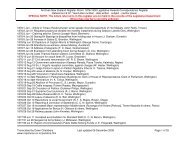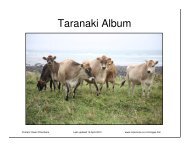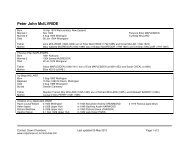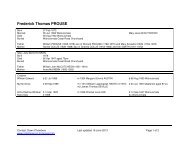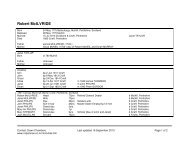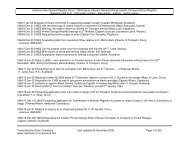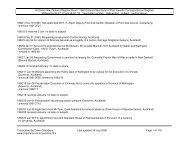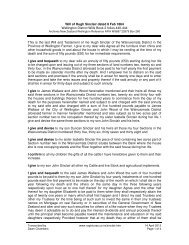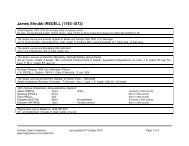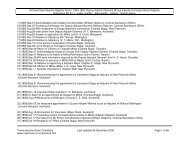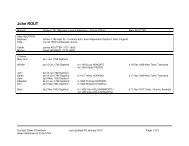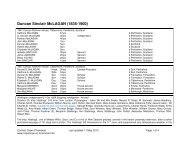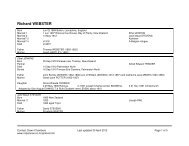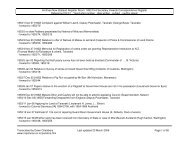Timeline - New Zealand Pictures
Timeline - New Zealand Pictures
Timeline - New Zealand Pictures
Create successful ePaper yourself
Turn your PDF publications into a flip-book with our unique Google optimized e-Paper software.
Maori Chiefs visit to England 1863-1864 & an audience with Queen Victoria<br />
Nelson Examiner and <strong>New</strong> <strong>Zealand</strong> Chronicle 06 Dec 1862 Exhibition of <strong>New</strong> <strong>Zealand</strong> Natives in England<br />
We have been requested by Mr Jenkins, Native Interpreter, to publish the following statement regarding a scheme he has matured for taking with<br />
him to England a number of <strong>New</strong> <strong>Zealand</strong> chiefs:-<br />
Five of our Nelson settlers, together with Mr Jenkins, who for many years has acted as Native Interpreter, having determined on visiting England<br />
for the sake of a change, and for the purpose of thereby recruiting their health, and being also desirous, if possible, of enjoying that change without<br />
pecuniary sacrifice, having determined on taking with them some few of <strong>New</strong> <strong>Zealand</strong>’s native chiefs, who also desire to see England, of which<br />
they have heard so much. Arrived in England, lectures are to be delivered to the public, upon the past and present state and future prospects of<br />
<strong>New</strong> <strong>Zealand</strong>, illustrated by the presence of the native chiefs. Mr Jenkins, desirous that the whole affair should be conducted with respectability,<br />
and wishing also to prevent, as far as is possible, the occurrence of any mishap, recently visited Auckland, and obtained the sanction of his<br />
Excellency the Governor and the heads of native departments to his scheme. We are informed that the party intend starting from Auckland, in the<br />
month of January next, by the Ida Ziegler; Auckland having been chosen as their port of departure, because the natives “desire to leave <strong>New</strong><br />
<strong>Zealand</strong> in the presence of the Governor.” None but the chiefs of some note will be selected, and we append a list of those who have already<br />
signified their desire to be of the party. In order to benefit these chiefs, and, through them, their tribes, they will have afforded to them every means<br />
of satisfying themselves on the points of England’s greatness and power, which, hitherto, to them has appeared to be “mere talk.” The chiefs will<br />
all be treated well by their conductors, their expenses will all be paid, and, should any profit remain, they will all participate therein. The party will<br />
be under the guidance of Mr Jenkins, and some of the natives will be accompanied by their wives and children. The following are the principal<br />
chiefs at present selected:-<br />
Matene te Whiwhi, Native Assessor, Otaki; Tamati Pirimona, Aorere; Hapimana Mokoera, Motueka; Wiremu Hapi, Wellington; Mohi, Waikanae;<br />
Paora Tuwhare, Assessor, Auckland; Hemara, Assessor, Mahurangi; Manuka, Kaipara, North of Auckland; Winiata Tomairangi, Assessor,<br />
Kaipara; Hori Tauroa, Assessor, Waiuku, South of Auckland; Kameriara te Wharepapa, North of Auckland; Reihana Taukawau, North of Auckland;<br />
Te Rei Nganiho, Motueka.<br />
And probably, Wiremu Katene te Puoho, Tamihana Rauparaha, and Hohepa Tamaihengia; also, one from Taranaki, and another from Wellington.<br />
Several of them will be accompanied by their wives, and perhaps a child or two.<br />
Contact: Dawn Chambers Last updated 19 July 2012 Page 1 of 14<br />
www.nzpictures.co.nz/maori1863tour.htm
Colonist 9 Dec 1862<br />
Mr Jenkins, for many years Native Interpreter, with a few other of our townsmen, have determined on taking several Maoris to England. The party<br />
will consist of the following, including the wives and children of several of them:- Matene te Whiwhi, Native Assessor, Otaki; Tamati Pirimona,<br />
Aorere; Hapimana Mokoera, Motueka; Wiremu Hapi, Wellington; Mohi, Waikanae; Paora Tuwhare, Assessor, Auckland; Hemara, Assessor,<br />
Mahurangi; Manuka, North of Auckland; Winiata Tomairangi, Assessor, Kaipara; Hori Tauroa, Assessor, Waiuku, South of Auckland; Kameriara te<br />
Wharepapa, North of Auckland; Reihana Taukawau, North of Auckland; Te Rei Nganiho, Motueka: and Wiremu Katene te Puoho, Tamihana<br />
Rauparaha, Hohepa Tamaihengia, and one or two from Wellington and Taranaki. It may be mentioned that Governor Grey cordially approves of<br />
the object of the enterprise. The Maoris will be shown everything connected with our naval and military establishments in England, as well as with<br />
the arts and manufactures; it being Mr Jenkins’s intention to take them into the large manufacturing districts of the North of England, as well as to<br />
show them the agricultural improvements, which have made such rapid strides of late. A few days at the Crystal Palace, Sydenham, would be<br />
advantageous, not only to the speculators, but impress a lifelong remembrance on the native mind of one of the most fairy scenes in the world.<br />
The party will sail from Auckland in January next.<br />
1863 Feb 05 DOCUMENT: Names of <strong>New</strong> <strong>Zealand</strong> Chiefs visiting England<br />
Australian and <strong>New</strong> <strong>Zealand</strong> Gazette 18 May 1863 p323<br />
The Ida Zeigler has arrived from Auckland with the following passengers and cargo:- Miss Rawson, Mr and Mrs Scotland, Mr and Mrs Werner and<br />
family, Mr and Mrs Farmer, Mr and Mrs Tutty, Captain Brown, Lieut Waugh, Lieut Baynton, Mr and Mrs Chamberlin, Captain and Mrs Barton and<br />
family, Miss Tyhurst, Mr and Mrs Fairburn and family, Mr Jenkins, Mr Milner, Mr and Mrs Carleton, Mr and Mrs Williams, Messrs Galea, Ditrich,<br />
Silva and Da Costa, Mr and Mrs Corbett, Rev. W. Calvert, Master McEwan, Master J. McEwan, Messrs Smith, Gimes, and Pike, 98 rank and file, 8<br />
women, 15 children and 15 natives.<br />
252 and half bales and 1 bag wool, D. Nathan; 24 bales do., J. Osborne; 31 bales and 2 bags do., Cruickshank, Smart, and Co.; 11 bales do., R.<br />
Hampton; 32 bales do., Brown, Campbell & Co.; 81 bales do., W. Buchanan; 7 bales do., Watt, Kennedy, and Watt; 5 bales do., James Busby;<br />
166 cases and 10 casks kauri gum, Combes and Daldy; 17 casks do., J. A. Drury; 96 casks do., W. Graham; 173 bags do., G. T. Jakins; 85 casks<br />
cocoa-nut oil, D. Nathan; 18 casks sperm oil, 9 casks whale, 12 hhds black, 32 casks cocoa-nut, 37 casks gum, 21 cases do., Owen and Graham;<br />
1 box fold, from Coromandel, 70ozs. 18dwts., valued at 240l, W. Buchanan; 2 cases manganese, 1 bbl. Currants, 7 bags sugar.<br />
1863 May 18 DOCUMENT: William Jenkins diary covering the Maori Chiefs visit to Queen Victoria (to 6 Feb 1864)<br />
The Observer 31 May 1863 Crystal Palace<br />
The <strong>New</strong> <strong>Zealand</strong> Chiefs, accompanied by their attendants and interpreters, were present at the Crystal Palace on Saturday. They have accepted<br />
an invitation to be present at the Palace next Saturday, the Queen’s birthday, in commemoration of which the great fountains will be played (for<br />
the first time this season), at two o’clock, prior to the concert.<br />
1863 Jun 01 DOCUMENT: Visit from the Natives of <strong>New</strong> <strong>Zealand</strong><br />
Contact: Dawn Chambers Last updated 19 July 2012 Page 2 of 14<br />
www.nzpictures.co.nz/maori1863tour.htm
The Manchester Guardian 11 Jun 1863 The Memorial of the Exhibition of 1851<br />
… the most striking scene in the whole course of the procession occurred in the centre of the great conservatory as the Prince and Princess came<br />
opposite the point where the group of <strong>New</strong> <strong>Zealand</strong>ers were stationed. Their attention was caught by the swarthy and strange looking islanders.<br />
They paused, and a colloquy took place among the royal party. The prince consulted the master of the ceremonies, the interpreter of the <strong>New</strong><br />
<strong>Zealand</strong>ers was summoned, and while the whole group and the Princes and Princesses exchanged salutations, the <strong>New</strong> <strong>Zealand</strong>ers spoke words<br />
of greeting and respect in their own tongue, which the translator rendered into English. During this pretty and touching scene the cheers of the<br />
crowd burst out again and again, and were renewed heartily when the Princes and Princesses moved on….<br />
The Manchester Guardian 12 Jun 1863 – From our Private correspondent, London, Thursday afternoon<br />
I am glad our correspondent saw the pretty scene of the interview between the Prince and Princess and the <strong>New</strong> <strong>Zealand</strong>ers, which seems to<br />
have escaped the reporteres for the morning journals – at least I find no mention of it in the Times or Telegraph. I understand these Maori visitors<br />
have no strictly official character, nor any public object. They have been brought over, I gather, partly to gratify their own curiosity, and partly to be<br />
used as lions by their English conductor and interpreter, as may be found expedient. The present object is to get them admitted to an interview<br />
with the Duke of <strong>New</strong>castle, as Colonial Secretary. They must have been delighted at their opportunity of saluting the Prince and Princess<br />
yesterday, and, at the curiosity of which they were the object, for it was not impertinently expressed, and the crowd was so festal and so gay, that<br />
it must have seemed a compliment to be the cynosure of such a multitude.<br />
Australian and <strong>New</strong> <strong>Zealand</strong> Gazette 20 Jun 1863 p409<br />
On Saturday thirteen <strong>New</strong> <strong>Zealand</strong>ers were presented to the Prince and Princess of Wales at Marlborough House, under the auspices of Mr W.<br />
Jenkins, the interpreter to the <strong>New</strong> <strong>Zealand</strong> Government. The party, whose arrival in this country we have lately noted, consisted of ten males and<br />
three females. The Prince conversed in a very friendly style with them through their interpreter, and his Royal Highness was assured by them of<br />
their friendliness towards the English people and their desire to become more intimately acquainted with them. They were evidently gratified with<br />
their visit and with the hearty English like welcome the Prince gave them. Afterwards they took luncheon with the Duke of <strong>New</strong>castle. On<br />
Wednesday, accompanied by Mr Jenkins, the party visited the departments of the Royal Arsenal at Woolwich by special order from the War<br />
Department. What chiefly interested them appeared to be the royal gun factories. They were much interested in witnessing the welding and<br />
preparing of slabs of iron for the manufacture of new trunnions and the preparation and casting of tubes.<br />
1863 Jun 27 PHOTOGRAPH by Vernon Heath of the Maori party with William Jenkins published in the Penny Illustrated <strong>New</strong>s.<br />
This photo was ‘presented’ by Mrs W. Jenkins (probably Mrs William Naylor Jenkins – Elizabeth nee Drake)<br />
National Libray Timeframes Reference A-018-015. Also see Bull, <strong>New</strong> <strong>Zealand</strong> Art History 5 (1977).<br />
Contact: Dawn Chambers Last updated 19 July 2012 Page 3 of 14<br />
www.nzpictures.co.nz/maori1863tour.htm
Illustrated London <strong>New</strong>s 11 Jul 1863 page 34<br />
The <strong>New</strong> <strong>Zealand</strong> Chiefs – (To the Editor) – Permit me, through your journal, to inform the public that the <strong>New</strong> <strong>Zealand</strong> Chiefs under my charge<br />
(whose position and rank are attested by official documents) are in no way connected with a performing troupe of natives who advertise<br />
themselves as “Maori Chiefs.” – Your obedient servant, W. Jenkins, Interpreter, <strong>New</strong> <strong>Zealand</strong> Government. 49, Weymouth-street, Portland-place,<br />
July 7.<br />
Australian and <strong>New</strong> <strong>Zealand</strong> Gazette 17 Jul 1863 p34<br />
Her Majesty on Tuesday received the party of <strong>New</strong> <strong>Zealand</strong>ers travelling in this country, under the auspices of Mr Jenkins, at Osborne, consisting<br />
of 13 persons, 10 males and three females, who arrived from London to have the honour of an interview, accompanied by Mr Jenkins. The Duke<br />
of <strong>New</strong>castle, Secretary of State for the Colonies, was present. They crossed over from Southampton in her Majesty's yacht Fairy, which was sent<br />
to meet them. The Queen, accompanied by their Royal Highnesses Princess Helena, Princess Beatrice, and Prince Leopold, and attended by the<br />
Hon. Mrs Bruce, the Hon. Beatrice Byng, and the gentlemen in waiting, received the Maoris in the Council-room, where they were severally<br />
presented by Mr Jenkins and had the honour of kissing her Majesty's hand. The heads of tribes then addressed the Queen through their<br />
interpreter. After partaking of luncheon, the whole party were taken on board the Victoria and Albert and went afterwards to Portsmouth.<br />
1863 Jul 18 PHOTOGRAPH of the Maori party with William Jenkins published in the London Illustrated Times.<br />
National Library Timeframes Reference PUBL-0033-1863-68<br />
1863 Jul 18 DOCUMENT: Article published in the Illustrated London <strong>New</strong>s titled “Native Chiefs from <strong>New</strong> <strong>Zealand</strong>”<br />
1863 Aug 08 DOCUMENT: Article published in the Australian and <strong>New</strong> <strong>Zealand</strong> Gazette – an account of the visit to Queen Victoria on 15 July.<br />
The Manchester Guardian 8 Aug 1863 The <strong>New</strong> <strong>Zealand</strong> Chiefs at Fulham Palace<br />
On Thursday afternoon the chieftains from <strong>New</strong> <strong>Zealand</strong> who have been so long in this country visited the Bishop of London at Fulham Palace, in<br />
pursuance of a wish to that effect expressed by His Lordship. The chiefs, who were 12 in number, and were accompanied by two of their wives<br />
and a single woman, arrived about five o’clock, with the Government interpreter, Mr Jenkins. The Bishop and Mrs Tait had an afternoon garden<br />
party on the occasion, and, as many visitors had arrived prior to the coming of the <strong>New</strong> <strong>Zealand</strong>ers, His Lordship invited all to the chapel in the<br />
palace, where a short service was held. As it was previously explained to the Bishop that the chiefs were acquainted with certain hymns and<br />
prayers, and that they could follow these by reading the prayer books in their native tongue, His Lordship selected these particular portions. The<br />
service was opened by the singing of the “Old Hundredth” Psalm, after which a few prayers and collects were said, and also the 33 rd Psalm, when<br />
the service was closed by the Bishop pronouncing the benediction. His Lordship was assisted by the Rev. F. J. Jackson and the Rev. J. J.<br />
Coxhead. The company then returned to the beautiful grounds adjoining the palace, where the more youthful portion indulged in ample outdoor<br />
sports, such as croquet, in which game one of the finest of the <strong>New</strong> <strong>Zealand</strong>ers seemed to take some interest. After promenading the gardens for<br />
some time, and entering into conversation with several of the visitors, the <strong>New</strong> <strong>Zealand</strong>ers took leave of the Bishop and Mrs Tait about seven<br />
o’clock.<br />
Contact: Dawn Chambers Last updated 19 July 2012 Page 4 of 14<br />
www.nzpictures.co.nz/maori1863tour.htm
1863 Oct 03 DOCUMENT: The <strong>New</strong> <strong>Zealand</strong> Chiefs in Birmingham – Birmingham Daily Post<br />
1863 Oct 07 DOCUMENT: The Maori Chiefs in Birmingham – Birmingham Daily Post<br />
Birmingham Daily Post 23 Oct 1863 – The <strong>New</strong> <strong>Zealand</strong> Chiefs<br />
The <strong>New</strong> <strong>Zealand</strong> Chiefs and Chieftainesses, as will be seen by reference to an advertisement in another column, are to attend two public<br />
meetings in the Town Hall on Thursday. In the afternoon the Chiefs Paratene, Wharepapa, Takerei, Reihana, Horomona, and Hapimana, with the<br />
Chieftainesses Haumu and Ngahuia, will attend (wearing their native costume) an aggregate meeting of Sunday School children. The Rev. Dr.<br />
Miller will preside. In the evening the Chiefs Paratene, Wharepapa, Takerei, Reihana, Horomona, and Hapimana will attend a meeting for all ages.<br />
Dr Melson will preside.<br />
1863 Nov 26 DOCUMENT: George William Wales Lightband diary covering the Maori Chiefs visit to England (to 12 Jul 1864)<br />
1864 Jan 16 DOCUMENT: Letter to Superintendent Nelson from Birmingham<br />
1864 Feb 26 DOCUMENT: Letter to Superintendent Nelson re emigration to NZ<br />
1864 Mar 02 DOCUMENT: Flier advertising a lecture to be held on <strong>New</strong> <strong>Zealand</strong><br />
<strong>New</strong> <strong>Zealand</strong> Herald 05 Mar 1864 page 5 column 2<br />
Some little amusement and considerable disgust has been occasioned here and throughout <strong>New</strong> <strong>Zealand</strong> generally, at the imposition which has<br />
been practised by Mr Jenkins, of Nelson, on the English public, and even on royalty itself. The natives taken home by Mr Jenkins were, as is wellknown<br />
here, of the lowest and most degraded class. One of the principal “chiefs” was a well known horse stealer and thief in the Wangarei<br />
district, a man in the habit of acting the pimp for his own wife, and the women were equally loose and dissolute. The whole affair was most<br />
disgraceful, and a libel on the natives themselves, presenting a parcel of tutua or common fellows, as chiefs and chieftainesses.<br />
1864 Mar 11 DOCUMENT: Farewell presents to the Maori Chiefs – A little “hitch” – Birmingham Daily Post<br />
1864 Mar 22 DOCUMENT: The Maori Chiefs in England – Daily <strong>New</strong>s<br />
1864 Mar 26 DOCUMENT: Mr Jenkins and the <strong>New</strong> <strong>Zealand</strong> Chiefs – Birmingham Daily Post<br />
Illustrated London <strong>New</strong>s 26 Mar 1864 page 303<br />
It is stated that the party of Maori chiefs who came over to England last year and were presented to the Queen, who stood sponsor to the child of<br />
one of them, have quarrelled with their European “interpreter,” who, indeed, proves to have been but a speculator, and have dispersed. Three left<br />
the man who brought them over, a Mr Jenkins, to take engagements at a London music-hall, two were sent home by the Queen, one is said to be<br />
in St. Bartholomew’s Hospital, two remain with Mr Jenkins, and the rest will have to be sent home by public charity, having broken the agreement<br />
with their Barnum.<br />
Illustrated London <strong>New</strong>s 09 Apr 1864 page 339 Metropolitan <strong>New</strong>s<br />
At the church of St. Anne, Limehouse, on Thursday week, Kamariera Te Wharepapa, one of the <strong>New</strong> <strong>Zealand</strong> Chiefs residing at the Strangers’<br />
Home, Limehouse, was married to Elizabeth Reid, of Marylebone.<br />
Contact: Dawn Chambers Last updated 19 July 2012 Page 5 of 14<br />
www.nzpictures.co.nz/maori1863tour.htm
1864 May 19 DOCUMENT: The <strong>New</strong> <strong>Zealand</strong> Chiefs – Communication from the Governor of <strong>New</strong> <strong>Zealand</strong> - Birmingham Daily Post<br />
Nelson Examiner and <strong>New</strong> <strong>Zealand</strong> Chronicle 28 May 1864 London Gossip – The Maoris in England<br />
The subjoined statement made by three of the natives who accompanied Mr Jenkins to England, has been forwarded for publication in this<br />
country, at the request of the writers, by a friend of Mr Sneyd Kinnersley, Stipendiary Magistrate of Birmingham, whose assistance appears to<br />
have been put in request to dissolve the agreement by which the parties were bound together.<br />
He Whakaaturanga Ki Gna Maori. Ko matou e mau nei o matou ingoa ki raro nei, e whakatupato ana ki a koutou, kei haere mai I te tini pakeha ki<br />
Ingarani, engari ma nga minita e whakatika mai; ma ratou tahi ko to Kawana, katahi ka tika; ka nui hoki to matou tangi ki tenei haere kuware mai o<br />
matou ki Ingarani. Kia rongo mai, no te tahi tekau ma ono o nga ra o Pepuere, 1864, matou me tera hunga atu tokorima, I haere tahi ai matou ki<br />
tenei whenua, I wetekina ai I ta matou kirimina, ko Tikena ratou ko ona hoa, I meatia ki te aroaro o te Kinari, he Kaiwakawa no Pamingamu, I<br />
Ingarani nei. Reihana Taukawau Ngatirangi, Kamariera Wharepapa, Paratene Te Manu. Pamingamu, Ingarani, Pepuere 25, 1864. [Translation.] A<br />
Notice to the Maoris. We the undersigned beg to caution you against coming to England with, or under the care of any Europeans, unless<br />
specially advised thereto by the clergy, or the Governor; for we have much cause to lament this, our ill-considered visit to England. Take notice,<br />
that on the 16 th day of February, we, with five more of the natives who accompanied us to this land, were legally released from our engagement<br />
with Mr Jenkins and his party, before Mr Kinnersley, the Stipendiary Magistrate of Birmingham. Reihana Taukawau Ngatirangi, Kamariera<br />
Wharepapa, Paratene Te Manu. Birmingham, England, February 25, 1864.<br />
1864 Jun 20 The ‘Surat’ departs from London for Auckland.<br />
The Morning Post 20 Jul 1864 Police Intelligence – Southwark<br />
An application of a very singular nature was made by Mr J. R. Foster on behalf of the six <strong>New</strong> <strong>Zealand</strong> chiefs brought to this country about twelve<br />
months ago. Mr Foster, who had spent some years among Maoris, was accompanied by one of the chiefs, a fine looking and intelligent young<br />
man. Mr Foster said a little more than a twelvemonth ago the young man who accompanied him was induced to leave his native land with five<br />
others by a person who placed before them such encouraging promises that they eagerly embraced the offer. When they arrived in Australia an<br />
agreement was drawn up wherein the six chiefs engaged to proceed to Europe to exhibit themselves in their private capacity, and in their war<br />
dances and other avocations in their native bush. Mr Woolrych asked what was wanted of him. Mr Foster replied that he wished for a summons<br />
against a Mr Haggerty, who resides in the Waterloo-road, for detaining the agreement. These poor <strong>New</strong> <strong>Zealand</strong>ers have been left penniless by<br />
the person who engaged them, and who was indebted to them a very large sum, and the agreement was required for the purpose of suing him in<br />
a court of law. Mr Woolrych asked what was the subject of the agreement. Mr Foster replied that, as far as he could understand, the party who<br />
brought them agreed to pay each of them £4 a month, including board and lodging and private clothing. Mr Woolrych inquired whether the <strong>New</strong><br />
<strong>Zealand</strong>ers had a copy of that agreement. Mr Foster said they had not. There were two copies made in Australia, and Mr Haggerty had both. It<br />
was to obtain the copy that he applied for the summons. These poor foreigners had not been paid a farthing since September, and now they were<br />
reduced to great want and privations. He therefore hoped his worship would assist them in obtaining their just rights. Mr Woolrych asked how<br />
much was due to these poor men. Mr Foster replied that as far as he could ascertain it was about £28 each.The men were in great want of their<br />
Contact: Dawn Chambers Last updated 19 July 2012 Page 6 of 14<br />
www.nzpictures.co.nz/maori1863tour.htm
money, as, in fact, they were now without a penny, and it would be a real charity to assist them. He was assisting them as well as he could, but he<br />
was not a rich man. Mr Woolrych directed a summons to issue for the restoration of the agreement.<br />
The Morning Post 25 Jul 1864 Police Intelligence - Southwark<br />
Michael Haggerty, of 54, Waterloo-road, was summoned by Aparehania Renyatora and five other <strong>New</strong> <strong>Zealand</strong> warrior chiefs, to show cause why<br />
he detained their part of an agreement entered into between them at Melbourne, and signed by all parties, the Maoris requiring it for the purpose<br />
of suing him for deserting them and neglecting to supply them with necessary food and money. James Stack, of the Church Missionary Society,<br />
who has been many years in <strong>New</strong> <strong>Zealand</strong>, gave his services, as none of the complainants could express themselves satisfactorily in the English<br />
language. Aparchania Renyatora, an intelligent-looking man, about 25 years of age, upon being sworn, said he was a native of <strong>New</strong> <strong>Zealand</strong>, and<br />
a Roman catholic. In May, 1863, he and the five other complainants left Auckland for Melbourne, where they were solicited by Haggerty to go to<br />
England for the purpose, as he said, of being shown to the Queen and the good people of England. They entered into an agreement to<br />
accompany him; their passage money was to be paid, and they were to receive £4 a month each, besides food and part of their clothing. The<br />
agreement was prepared by the crown solicitor, and properly executed by all parties. They arrived thirteen months ago, and for some time they<br />
performed at theatres in London, Worcester, Brighton, Birmingham, and Sheffield, appearing in the native costume and going through their war<br />
dance before the public. They were, however, disgusted with that mode of living, and required either to be sent back or placed in another way of<br />
getting their livelihood. Haggerty left off paying them regularly last October, and they had since engaged the City Theatre for a short time. He still<br />
refused to pay them, and the agreement, which had been re-executed since their arrival in England, was detained by him, and he would not give it<br />
up. The defendant’s solicitor handed up the agreement, which he said was detained in consequence of the complainants refusing to pay the<br />
charge of £2 7s for the re-execution in England. Mr Stack, in answer to the magistrate, explained that the present complainants were not<br />
connected with the nine <strong>New</strong> <strong>Zealand</strong> chiefs who were some time ago sent back to their own country. Their return had been effected through the<br />
instrumentality of Miss Weale, who had got up a subscription for them, and had lost as much as £300 by the business. She had also materially<br />
aided the present applicants, and he hoped that the public would come forward and recompense her for the outlay. Mr Woolrych said the<br />
agreement was perfect and regular, but he could not order its restoration until the costs were paid. Mr Chasion, the secretary to the Aborigines<br />
Protection Society, here stepped forward and said he had no doubt the society would pay the money required, and would assist the complainants<br />
in prosecuting their rights against the defendant. The case was then ordered to stand over till Tuesday.<br />
Daily Southern Cross 4 Oct 1864<br />
Port of Auckland Arrival:- Surat, ship, 999 tons, Fitzgerald, from London, with general cargo.<br />
Arrival of the Ship Surat, from London. Captain Anderson, of the steamer Star of the South, which arrived in harbour last evening, reports being in<br />
company with the ship Surat, from London to this port, off the Barrier yesterday afternoon. She was coming in with a fair wind, and it is supposed<br />
she would anchor outside of Rangitoto reef last night and would come into harbour this morning. The Surat is a vessel of 1,000 tons, in command<br />
of Captain FitzGerald. She sailed from London on the 20 th June, and has made a good passage of 105 days. She has 140 passengers on board,<br />
all in good health. The above is all the information Captain Anderson could obtain. The following is the cargo of the Surat:-…<br />
1864 Oct 05 DOCUMENT: Daily Southern Cross – The Surat, from London<br />
Contact: Dawn Chambers Last updated 19 July 2012 Page 7 of 14<br />
www.nzpictures.co.nz/maori1863tour.htm
<strong>New</strong> <strong>Zealand</strong> Herald 05 Oct 1864 The Show Maoris<br />
Among the passengers by the ‘Surat’ is the individual named Jenkins, who took home to England a number of Natives whom he represented as<br />
chiefs and showed about the country. These poor wretches have, some of them, got back to their own country at last. Two of them, however, have<br />
died upon the passage back. We do not know whether Mr Jenkins made a profitable speculation, but, doubtless, the good people of England had<br />
more sympathy than pence to bestow upon the exhibitor of the interesting specimens. The English journals, however, disclosed the want and<br />
wretchedness to which the poor creatures were themselves reduced in a strange country.<br />
<strong>New</strong> <strong>Zealand</strong> Herald 07 Oct 1864<br />
The ‘Surat’ from England, with 140 passengers on board, has arrived during the past week. Among these were the Maoris taken to England by a<br />
person named Jenkins. Of these unfortunate creatures, concerning whose desertion when in England, and of whose consistent misery relieved by<br />
public subscriptions, the colonists read with indignation and disgust, two died upon the passage. To admiring lovers of dark-skinned aboriginals at<br />
home these individuals were represented as chiefs and chieftainesses. On a former occasion we have stated that this was an imposition on the<br />
English public and a gross libel on the Maori aristocracy itself. The men were of a low class and stamp, both as to standing and character, and of<br />
the women we would rather say nothing.<br />
Daily Southern Cross 18 Oct 1864<br />
An accident, fortunately unattended with any other result than a good ducking, occurred to two watermen and a passenger by the ship ‘Surat,’ last<br />
evening, about dusk, by the upsetting of a boat. They had arrived at the watermen’s stairs, and were endeavouring to land a large and heavy box,<br />
when it fell into the water, capsizing the boat, and throwing the occupants into the water. They were, however, promptly rescued; and the box has<br />
since been recovered.<br />
1864 Oct 28 DOCUMENT: Daily Southern Cross – Melancholy Suicide on the body of Samuel Wakeman – passenger on the Surat<br />
1864 Nov 25 DOCUMENT: Daily Southern Cross – The <strong>New</strong> <strong>Zealand</strong>ers in London (ex Morning Post) – return of William Pou<br />
1864 Dec 12 DOCUMENT: Nelson Examiner and <strong>New</strong> <strong>Zealand</strong> Chroncile – Mr Jenkins’ Visit to England<br />
1864 Dec 15 DOCUMENT: Daily Southern Cross – Mr W. Jenkins and the Maoris<br />
1864 Dec 16 DOCUMENT: Letter to Superintendent re Native Interpreter position<br />
Taranaki Herald 27 Sep 1873 An Aristocratic Marriage at the Thames<br />
The ‘Advertiser’ gives the following description of a marriage in high life which has recently been celebrated at the Thames:- “The happy<br />
pair being descendants of the noble race of Hauraki aboriginals. The bridegroom was Hori Taipari, son of W. H. Taipari, Esq., the principal<br />
chief of the tribe, and owner of Shortland town lands. The bride was a relative of the tribe, who has recently been brought over from<br />
Melbourne by Mrs Mohi and the bridegroom, who visited Australia for that purpose a few months ago. It appears that the bride’s friends<br />
have remained in Melbourne since their return from England, some years ago, when abandoned by Mr Interpreter Jenkins. The marriage<br />
was celebrated in style, three vehicles being employed in the conveyance of the wedding party to church. After a récherché breakfast, and<br />
several drives round the district, the happy couple left, in company with their friends, for Tararu, in order to await the departure of the<br />
steamer for Auckland, whither they proceeded to spend the honeymoon.”<br />
Contact: Dawn Chambers Last updated 19 July 2012 Page 8 of 14<br />
www.nzpictures.co.nz/maori1863tour.htm
Otago Witness 03 Jan 1906 The Early <strong>New</strong> <strong>Zealand</strong> Missions<br />
… [Samuel Marsden’s] father, Thomas Marsden, was a blacksmith by occupation, and may have added to this as stated by the Rev. J. B.<br />
Marsden that of a small farmer. He died at the advanced age of 93 years. Stray references show that he had at least one brother and a<br />
cousin who dwelt in Leeds engaged in some branch of the woollen trade. His early education must necessarily have been of the most<br />
slender kind. For such as him the schoolmaster had not yet begun his walks abroad. For some time he followed his father’s trade of<br />
blacksmith, and an interesting relic of this fact lies hidden somewhere in <strong>New</strong> <strong>Zealand</strong> which a careful search has hitherto failed to discover.<br />
Forty years ago a party of 13 Maoris accompanied by their interpreter, Jenkins, visited the Home Country, partly with the view of affording<br />
an example to British people of what benefits Christianity and civilisation had conferred upon their race. Amongst many places visited by<br />
them was the old home of Marsden, their first great friend and benefactor, and at the adjoining village of Horsforth his grand-nephew, Mr C.<br />
W. Marsden, dwelt, carrying on the old blacksmith’s business, who presented them with a small steel anvil, upon which, almost a century<br />
before, Marsden himself had forged many a nail.<br />
Letter from John Adams, Licensed Native Interpreter, First Grade, Native Land Agent, PO Box 38, Hawera 25 Jun 1915<br />
Dear Mr Jenkins, Herewith please find translation of letter received by me from your friend ‘Wharepapa’. The trip to England seems to have<br />
been the very thing it was intended to be; and from what Wharepapa says it bore fruit in abundance. I will await your instructions regarding<br />
the next move. Yours faithfully, John Adams. Copy of original letter.<br />
Translation of letter of Kamariera Wharepapa, Pakotai, June 21 st , 1915.<br />
John Adams, Friend, Salutations. Your letter of the 4 th of June has reached me. The statement that we degraded ourselves, (became<br />
demoralised) and the land of our birth, <strong>New</strong> <strong>Zealand</strong>, when we reached England is something that I am unaware of. I have a letter written<br />
by the hand of (the late) Queen Victoria, and handed by her to me; I have it at the present moment while writing this. I have a full<br />
knowledge of our visit to England. Our greatest object on reaching England was to fill our hearts with the “Faith” of the English (Religious<br />
Faith). On our return we spoke of it (The Faith) to our relations, and immediately there were built “Three Churches”, at Mangakahia,<br />
Ohaewai, and Kaikohe. When Ngapuhi saw this they raised many Churches, and all Ngapuhi joined in the Faith, sending their children to<br />
the Schools of the Ministers. The whole of Waikato, Te Arawa, Waipu, Turanga, and Heretaunga then joined in. (In the Faith). Conversation<br />
by letter is not good; and it is for Yourself and Mr Jenkins to arrange that we see each other personally, whether at Auckland, or as you<br />
might chose. This is all the reply to your letter, as it is not the best mode of holding a converstaion. Kia Ora to Yourself and Household,<br />
Kamariera Wharepapa. Writer:- Aperahama K. Wharepapa.<br />
Eltham Argus 12 Jan 1933<br />
Married Maoris. Two London Women. Encounter in bush. A Surveyor's memories. Auckland. This day. The finding of the two<br />
Englishwomen who, unknown to the rest of the white community in <strong>New</strong> <strong>Zealand</strong>, and despaired of by their relatives in England, had lived<br />
for years practically as slaves with the Ngapuhi Maoris, a meeting in the bush fastnesses of Taranaki with Kimble Bent, who, because he<br />
had been flogged, deserted from the British soldiery and became a "pakeha-Maori" were among the experiences spoken of this morning by<br />
Contact: Dawn Chambers Last updated 19 July 2012 Page 9 of 14<br />
www.nzpictures.co.nz/maori1863tour.htm
Mr D. G. Fraser, a retired surveyor who lives now in Tenterden Avenue, Mount Eden. Mr Fraser followed his profession just after the Maori<br />
Wars were finished, when the land was first divided. When he came to <strong>New</strong> <strong>Zealand</strong>, one of the first posts Mr Fraser held was that of<br />
school teacher, and in 1872 he was sent to open a Maori school at Mangakahia, in North Auckland. "I went to Waitangi Falls by steamer"<br />
said Mr Fraser, "and from there went on horseback under the guidance of a Maori named Sydney Taiwhanga. We arrived the following<br />
evening at Mangakahia. Needless to say there were no roads, and but miserable tracks. When we got to the meeting house it was dark,<br />
and the light in the house was supplied by a big fire, round which squatted about 100 men, women and children. "Exhibition" in London. "I<br />
presented a letter from Donald McLean, Native Minister, and, as I knew no Maori, a woman from the crowd came forward to interpret. To<br />
my astonishment I saw that she and another woman were white, and learned afterwards that they had been 14 years with the natives. It<br />
appears that a party of natives, picked out for their ferocious aspect and tattooing, had been taken to London by a Mr Jenkins of Nelson,<br />
with the idea of exhibiting them. As they found that out the Maoris refused to be exhibited, and they became practically stranded in London.<br />
"Two of them, however, married white women, who were maidservants and, as a subscription was raised to enable the Maoris to go back<br />
to <strong>New</strong> <strong>Zealand</strong>, the girls followed their husbands, whose names were Wiremu Pou and Kameara te Wharepapa, both chiefs. Wiremu Pou<br />
died shortly after he returned, and his wife was practically a sort of slave when I saw her. She had been bought by a bushman - a white<br />
man - for the sum of £2. The other white woman was of a more refined nature, and took her stand among the tribe. In conversations they<br />
told me that they had been given to understand in London that if they married the natives they would rank as princesses in <strong>New</strong> <strong>Zealand</strong>;<br />
but, when they got here, they found they had to dig, hoe and sow, while their swains squatted by and did nothing."<br />
Hariru Wikitoria Epilogue : For nine years [Elizabeth Ann nee REID] was without contact with European <strong>New</strong> <strong>Zealand</strong>. Then, in July 1872<br />
Dr Gennes Fraser arrived in the valley to open a school. It had taken him two days on horseback over rough bush-tracks to reach the<br />
isolated heart of Northland. Fraser's knowledge of Maori was meagre, which put him at a distinct disadvantage when, before the assembled<br />
locals, he stood to read his letter of introduction from the Native Minister. Elizabeth Wharepapa came forward and solved the problem.<br />
The second lady : Georgiana MEEN<br />
born Jun Qt 1841 Wangford, Suffolk; baptised 30 May 1841 – dau of Elizabeth Meen<br />
Banns of Marriage Register, Christ Church, St Marylebone, Westminster<br />
Wiremu Pou, bachelor; Georgiana Meen, spinster – Banns were read on the Sundays of 21 Aug, 28 Aug and 4 Sep – married 7 Sep<br />
Marriage Register Christ Church, St Marylebone, Westminster<br />
Entry No. 451 Married 7 Sep 1864 by G. Thomas M. Gorman in the presence of James Stack & Dorotea Weale<br />
Wiremu Pou, full age, bachelor, agriculturalist of Linton Place, son of Pou, <strong>New</strong> <strong>Zealand</strong> Chief – signed the register<br />
Georgiana Meen, full age, spinster of Linton Place, dau of John Meen, attorney – made a cross in the register<br />
Contact: Dawn Chambers Last updated 19 July 2012 Page 10 of 14<br />
www.nzpictures.co.nz/maori1863tour.htm
1851 Census 110 High St, Kingston upon Hull, Yorkshire<br />
Henry WAKELIN Head 38yrs Tailor b Louth, Lincolnshire<br />
Elizabeth WAKELIN Wife 26yrs b Bungay, Suffolk<br />
Daniel WAKELIN Son 14yrs Apprentice shoemaker b Louth, Lincolnshire<br />
James WAKELIN Son 10yrs Scholar b Swinehead, Lincolnshire<br />
Ann MEEN Sis-in-law 28yrs Dressmaker [unmarried] b Bungay, Suffolk<br />
Georgiana MEEN Niece 10yrs Scholar b Bungay, Suffolk<br />
Arthur BETHEL Lodger 26yrs Shoe Maker [unmarried] b Stow Market, Suffolk<br />
Ann WARD Lodger 29yrs Washerwoman [unmarried] b Eldon, Lincolnshire<br />
Eliza WARD Lodger 4yrs b Hull, Yorkshire<br />
Message posted to Maori.org.nz 13 Feb 2008 by Norman Beazley<br />
http://www.maori.org.nz/papa_panui/forum_topic.asp?cat_id=2&FORUM_ID=3&TOPIC_ID=4475&Topic_Title=Wi+Pou+-<br />
+Georgiana+Meen+%3A+(Royal%2FRoera)+Mangakahia&Forum_Title=Tracing+Tupuna+(Ancestors)<br />
If anyone is able to assist I am trying to find the whakapapa for Wi Pou, from Mangakahia who married Georgiana Meen from England. Wi<br />
Pou visted England in the 1860's along with other chiefs from the North including Ngati Horohia Chief, Te Hautakiri Kamariera Wharepapa.<br />
Georgiana was a member of Queen Victorias household and she gave the marriage her blessing. Wi Pou claimed the union had been<br />
blessed by the Queen, so their first born was named William Royal Pou. This is how the name Royal/Roera came into effect in the North. I<br />
am the great grandson of William Royals sister, Ngaroma Pou who married Hare Pikari, and subsequently Arena.<br />
Alexander Turnbull Library MS-Papers-3350<br />
Letter, dated 16 Apr 1934, re Jenkins and the ‘peace mission’ to UK with 13 Maori chiefs written to J. C. Andersen by Catherine Elizabeth<br />
Chambers (nee Sinclair).<br />
Auckland Weekly <strong>New</strong>s 20 Feb 1957 pages 10-11<br />
Image: Te Hau Takiri Wharepapa of Mangakahia, Northland, was described by Mr Jenkins as “the most intelligent of our party.” Considered<br />
a particularly handsome man, he captivated the fancy of an English girl who accompanied him on his return to <strong>New</strong> <strong>Zealand</strong> as his wife;<br />
Image: The christening set presented to Albert Victor Pomare by Queen Victoria now in the Albert War Memorial Museum.<br />
"Mr Jenkins is a long tried and zealous servant of the Government, is a warm friend of the natives, has their confidence, and can be safely<br />
entrusted with any matter which may conduce to their benefit." With such an assurance, Grey did not hesitate to approve the idea, but the<br />
struggling colony could provide no financial backing. Relying on practical support in England, and with the help of some friends, Mr Jenkins<br />
undertook full responsibility for his scheme himself. There was no lack of Maoris keen to make the trip, and Mr Jenkins selected 10 chiefs<br />
and four highly born native women, all from districts so far unaffected by the unrest in Taranaki and the Waikato. The party sailed from<br />
Auckland on February 6, 1863, (five months before the outbreak of the Waikato War) in the ship Ida Zeigler, and reached Plymouth on May<br />
Contact: Dawn Chambers Last updated 19 July 2012 Page 11 of 14<br />
www.nzpictures.co.nz/maori1863tour.htm
14. Their reception (as described in Mr Jenkin's journal, a copy of which is now in the possession of his grandson, Mr A. S. Jenkins, of Glen<br />
Eden) was most cordial. They were taken to Marlborough House to meet the Prince of Wales – then a young man of 22 and afterwards<br />
King Edward VII. They dined with the Duke of <strong>New</strong>castle, Secretary of State for the Colonies, who undertook to present them to the Queen.<br />
Her Majesty, then only a year or two older than her great granddaughter, Queen Elizabeth II is today, received them graciously at Osborne.<br />
The Prince Consort had been dead for less than two years, and Victoria entered the reception room dressed in black satin and wearing a<br />
widow's cap. She was accompanied by Princess Helena, then a girl of 17, Prince Leopold, aged 10, and Princess Beatrice, aged six, and<br />
members of the Royal household. The tattooed chiefs - their heads adorned with the huia feathers of their rank, and wearing shark's tooth<br />
or greenstone ear pendants – and the wives of four of them, were all arrayed for the occasion in their finest flax cloaks. With Mr Jenkins<br />
acting as interpreter, the Queen talked with individual members of the party. On learning that Hare Pomare's wife, Hariata, was expecting a<br />
baby, Her Majesty expressed a wish to stand godmother to the child. If a girl, she said, it should be named "Victoria", and if a boy "Albert".<br />
The child was born later in London. Queen Victoria's christening gift, now in the Auckland War Memorial Museum, was a silver gilt<br />
exquisitely designed cup, knife, spoon and fork. The cup and knife were inscribed: "To Albert Victor Pomare, from his godmother, Queen<br />
Victoria, November, 1863." The visit to Osborne was the highlight of a tour packed with excitement for the unsophisticated visitors from<br />
<strong>New</strong> <strong>Zealand</strong>. They spent two months seeing the sights of the capital of the Empire. They were shown through The Times office and the<br />
Bank of England, and went to the opera with which they were "delighted beyond measure." At John Wesley's house the party formed the<br />
subject of the painting reproduced on the opposite page. A photograph of the group, in the same setting, was published in the Illustrated<br />
London <strong>New</strong>s. They enjoyed the hospitality of such notable men as the Bishop of London, Lord Melbourne, Lord Shaftesbury and Lord<br />
Leven, at whose house they met the famous Swedish singer Jenny Lind. They were shown the Royal Arsenal at Woolwich, where they saw<br />
"great guns and castings", and Portsmouth Dockyard. Later, the party was invited to Bristol where the Mayor arranged a luncheon to enable<br />
them to meet 50 or 60 leading citizens. For nearly two months Mr Jenkins made Bristol his headquarters, visiting from there Bath,<br />
Cheltenham and other west of England towns. But travel cost money and, while the Maoris were enjoying themselves, Mr Jenkins worries<br />
mounted. Funds were running short; no help seemed to be forthcoming from his highly placed English hosts who had frowned on his plan<br />
to recoup expenses by a lecture tour. To finance the trip, Mr Jenkins had sold all his property, including even his house in Nelson. Far from<br />
receiving any practical assistance, he found that - as the <strong>New</strong> <strong>Zealand</strong> Herald said acidly on his return - "the good people of England had<br />
more sympathy than pence." Finally, the Shaw Savill shipping line arranged a lecture tour, on the subject of <strong>New</strong> <strong>Zealand</strong>, promising so<br />
much a head on all immigrants the Maoris succeeded in influencing. With this help, and a large private contribution, Mr Jenkins and his<br />
party were able to return home. They reached Auckland in the ship Surat on October 4, 1864. Less than four years later, worn out with his<br />
labours, (which had included sitting up late, night after night, answering the scores of letters which had poured in daily during the tour) and<br />
financial worries, Mr Jenkins died at Wanganui, a poor man. The world is hard on the idealist. In the closing years of his life, Mr Jenkins had<br />
appealed to the Government for a pension, as some compensation for his personal outlay in the interests of racial harmony. The venture<br />
had cost him 3,000 pounds and no small amount of worry. The harassed colony, at its wits'end to pay for the recently concluded war,<br />
made him a grant of 50 pounds, which he did not live to enjoy.<br />
Contact: Dawn Chambers Last updated 19 July 2012 Page 12 of 14<br />
www.nzpictures.co.nz/maori1863tour.htm
Northern Advocate 16 Mar 1974 - Royal Name had Queen's blessing<br />
Wi Pou, while in England, won the heart of a young woman member of Queen Victoria's household named Georgiana. The story goes that<br />
the Queen gave their marriage her blessing and that her Royal command was that the first-born of the union, if a son, should take the<br />
surname Royal. The first-born son of the marriage was Joseph Desmond Royal of Pakotai. The eldest son of the late Mr and Mrs Joseph<br />
Royal is Mr William Royal, Pakotai ex-kauri bushman, who had his 80th birthday yesterday. His mother was Miss Emily Tregonning of<br />
Onehunga.<br />
NZ Listener 4 Oct 1975 p15 A Maori Godson<br />
Sir – In view of the Edward VII series currently running on TV1, it may interest viewers to know that Queen Victoria had a Maori godson.<br />
Here is the story: Elizabeth Colenso, who was born at Kerikeri, had married William Colenso at the wish of her father, but the marriage<br />
crumbled and in 1860 Elizabeth travelled to England. She spoke fluent Maori and was a great admirer of, and was greatly admired by, the<br />
Maori people of Northland. In London she proved to be a kindly friend to the many Maoris who found their way there. One was Hare, son of<br />
Chief Pomare, whom Elizabeth had known 32 years before. She made it her business to do what she could for Hare and his wife, Hariata,<br />
who were expecting their first child. Elizabeth considered the Asian Hotel where they were staying a most unsuitable place for Hariata to<br />
have her child. Mrs Colenso went to considerable trouble to find suitable accomodation for her Maori friends. When the child was born, its<br />
birth was reported to Queen Victoria, who sent a message through the Colonial Office expressing the wish that she be the child’s<br />
godmother. Furthermore, she desired that the child be named Albert Victor. In honour of the christening the Queen sent a beautiful gold cup<br />
in an elegant Morocco case, bearing the inscription, Albert Victor Pomare, from his godmother, Queen Victoria, November 1863. A few<br />
days later Pomare received a message from the Duke of <strong>New</strong>castle’s secretary expressing Her Majesty’s wish to see her godson at<br />
Windsor. The Queen kissed the boy, admired his healthy appearance and said she would always take an interest in him and hoped that he<br />
would grow up to be a good man. In a suitable reply the Maori chief thanked the Queen for the many great kindnesses she had shown his<br />
family, for the magnificent gold cup she had given the babe and for the £25 she had presented to Hariata. Then, as the child began to<br />
exercise its lungs, the Queen and princesses withdrew. Albert Victor Pomare grew to manhood, but was eventually lost at sea. The gold<br />
cup presented by his godmother is on display at the Auckland Museum. [photo of cup] Hemi Bennett (Gisborne)<br />
Auckland City Libraries NZ Card Index – References for William Jenkins - http://www.aucklandcity.govt.nz/dbtw-wpd/nzcardindex/<br />
Bulletin of <strong>New</strong> <strong>Zealand</strong> Art History 1977 Volume 5 pages 3-9 and 1978 Volume 6<br />
<strong>New</strong> <strong>Zealand</strong> Listener 28 Oct 1978 page 72<br />
Contact: Dawn Chambers Last updated 19 July 2012 Page 13 of 14<br />
www.nzpictures.co.nz/maori1863tour.htm
Northern <strong>New</strong>s 11 Feb 1986<br />
Elizabeth Ann Reid was a teenager working as a maid when she met Ngati Horohia chief Te Hautakiri Kamariera Wharepapa in England in<br />
August 1863 and they fell in love... Another Ngapuhi member of the delegation of 14 Maoris who went to England in 1863, Wiremu Pou,<br />
also returned with an English bride, Georgiana Meen. Pou claimed the union had been blessed by Queen Victoria, so a son was named<br />
William Royal Pou and Royal later became the family surname. The marriages between the two Maoris and young Englishwomen did not<br />
endure, with both women eventually moving to Auckland and remarrying Europeans.<br />
Contact: Dawn Chambers Last updated 19 July 2012 Page 14 of 14<br />
www.nzpictures.co.nz/maori1863tour.htm



